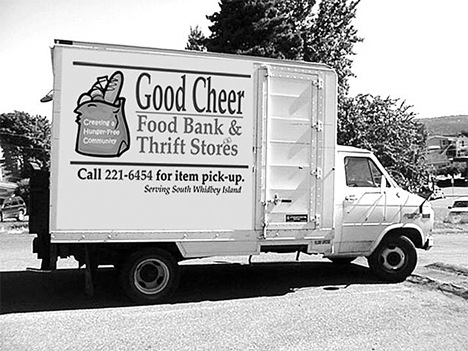BAYVIEW — The well-known Good Cheer Food Bank delivery truck was on its last mile in December when its engine failed. The non-profit organization that helps people in need of food has since found itself in need of a new truck.
For nearly 20 years, Good Cheer’s iconic truck, with its bright logo of a full grocery bag of food painted on its side, had traveled hundreds of thousands of miles.
Likely, more than 400,000 miles, estimated Kathy McLaughlin, executive director of Good Cheer Food Bank.
Sitting in the seats of the 1987 Chevrolet G30 van, one can see the effects of those miles firsthand. The driver seat rests too close to the steering wheel — and it’s not securely fastened to the floor.
A gray seat cover hides the passenger seat’s upholstery, which has been repaired with several strips of duct tape.
The flooring material at the driver’s feet has been worn away, and the odometer reads 82,109. Christmas tree car fresheners hang from unused knobs.
Good Cheer’s most recently hired driver, Khori Bolner, viewed the truck as more than simple transportation.
“For three months, that was my office, to and from different locations, with more than a couple thousand miles,” Bolner said.
“It was a lovable truck, with its squeaky seats and a radio that didn’t work. It definitely needed to be warmed up,” he added. “It was a good metaphor for Good Cheer. There wasn’t anything that we couldn’t do with it.”
Good Cheer purchased the truck new in 1988, with assistance from a $6,000 grant from the Boeing Good Neighbors fund for the box and Tommy lift.
The drivers made twice-weekly trips to Seattle to collect pallets of food from Northwest Harvest and Food Lifeline. During the rest of the week, the truck was used to transport food as well as furniture, appliances and other large volume donations meant for Good Cheer’s thrift stores.
The local community took ownership of the truck, said Good Cheer driver Damien Cortez.
“I would get calls telling me that a tire was low on air,” he said.
“We would get accosted by customers in stores. I had never been verbally accosted like that before. It was the community’s truck.”
But Bolner and Cortez both saw the truck’s demise coming.
“It’s had 20 years of good service,” Cortez said.
“It had been the little things that were needling us. For the last three years, we’ve been babying it along. We recently spent $1,000 repairing a tie rod. I’d been listening for new noises and had heard a weird hum.”
Good Cheer’s transportation manager David Phelps heard the noises as well. Phelps has worked for 13 years at Good Cheer and kept the truck as mechanically sound as he could.
“As far as taking care of it, I was making sure things were checked all the time, things like normal vehicle maintenance. I made the policy that when the drivers stopped to get gas, they also had to check the oil, water and tires to make sure they were up to par,” Phelps said.
Phelps saw the truck’s wear and tear every time he inspected it.
“The truck itself has done more than its fair share,” he said. “A lot of load and a lot of mileage.”
For drivers Bolner and Cortez, the truck’s last day started out with a normal produce run.
“We were headed north of the island to get 1,900 pounds of potatoes,” Cortez said. “We pulled into Greenbank Farm because we were having troubles with it overheating.”
“But it was terminal,” said Bolner, who once worked as a mechanic.
The truck had thrown a rod, which broke the engine casing.
Good Cheer’s board of directors assigned a committee to look at options for getting another truck, McLaughlin said. “Louise Prewitt is looking at new vehicles, Bill Watts is looking at used vehicles and Damien represents the staff, filling the board in on what else is needed,” she said.
Good Cheer is now looking for a 20-foot box truck or cut-away cube van with an automatic transmission and, of course, a stereo that works.
The truck also will need a 48-inch lift gate and roll doors. It will also have to have the Good Cheer logo on the side, she said.
Until Good Cheer gets a new truck, it is renting a van for $300 a week and 14 cents per mile, plus gas costs, which will add up.
“We’re still working on this, crunching the numbers,” McLaughlin said. “Any donations or help would be appreciated; whatever is best for Good Cheer in the long run.”



